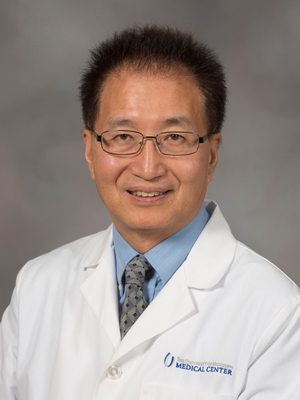
Investigator Highlight: Dr. Shou-Ching Tang
Published on Tuesday, October 11, 2022
Dr. Shou-Ching Tang is the CCRI associate director for clinical and translational research. He is a breast cancer medical oncologist and clinical researcher who leads the CCRI clinical trials programs, including its Phase 1 trials. Tang participates in multiple national and international organizations seeking better cancer care and treatments.
How long have you worked with your current organization and what type of research do you do?
I came to UMMC five years ago to work with others to build the CCRI clinical research program. Since then, I have helped enhance our clinical trial office, created a Phase I cancer program, an experimental therapeutics program and a breast cancer research program. Today, CCRI has 11 clinical trial research personnel running 60 clinical trials.
Our Phase I program has operated seven trials with four ongoing. Patients come from Mississippi and from other states. We currently have 11 additional Phase I trials in our pipeline.
CCRI has more than 40 members from UMMC and Ole Miss who, through bimonthly virtual meetings, can collaborate on cancer research across disciplines on both campuses. This research platform has generated new approaches to cancer prevention, detection and treatment and helped researchers secure research funding.
We also host a monthly clinical trial sponsor's pipeline meeting to bring cancer providers and researchers together with companies offering the latest cancer therapies.
More than 40 companies have presented their pipeline and clinical trial opportunities, including some who were never previously in Mississippi.
Would you describe your most recent research and/or publications?
Antibody-drug conjugates (ADC) are widely researched and used in cancer treatment. It is used to deliver chemotherapy to cancer cells by linking the drug to an antibody which in turn binds to the cancer cells and releases the payload to kill the cancer cells. They also cause toxicities.
I recently studied the mechanism by which ADC’s cause systemic toxicities due to different linkers used in the ADC design. I discovered that for some ADC's, the systemic toxicities are due to tumor cell destruction and toxicities are associated with better patient survival. For other ADC's, the toxicities were related to premature release of payload. We presented the finding at the recent American Society of Clinical Oncology in Chicago. The research has huge impact on the design and clinical application of ADCs in many types of cancers.
I also study novel immunotherapy in cancer through Phase I trials. Immunotherapy treatments strengthen a person’s immune system so it can find and target cancer cells. These therapies are great for patients because they tend to have fewer toxic side effects but some cancers are resistant to them. I’m working with others to explore second and third generations of immunotherapy and to find why some cancers resist them and how to overcome that obstacle.
CCRI recently was second author on two Phase I trials presented in ASCO in Chicago and European Society for Medical Oncology in Paris. I also am collaborating with researchers outside the USA to study stem cells and immunotherapy in cancer.
How does your recent research and/or publications relate to your overall research within cancer?
I am always interested in the molecular mechanism of oncogenesis and cancer treatment. With the advancement of molecular biology and precision oncology, an increasing number of novel therapies are being developed.
My current research will help:
- To design better anti-body drug conjugates with higher efficacy and less toxicities.
- To further develop second and third generation immunotherapy to increase the efficacy and to overcome drug resistance.
- To tackle cancer dormancy by targeting stem cells which may lead to the ultimate cure for metastatic cancers.
What inspired your most recent research and/or publications?
I want to contribute to a cure for cancer. Right now, I search for better cancer treatments that are more efficient and less toxic. I want to provide this for my patients and those of my colleagues.
What advice can you give medical students and/or high-school students who are interested in pursuing a career in research?
Always ask questions and try to find answers. Aggressively seek something better for our patients. Complacency will not enable us to find a cancer cure.


